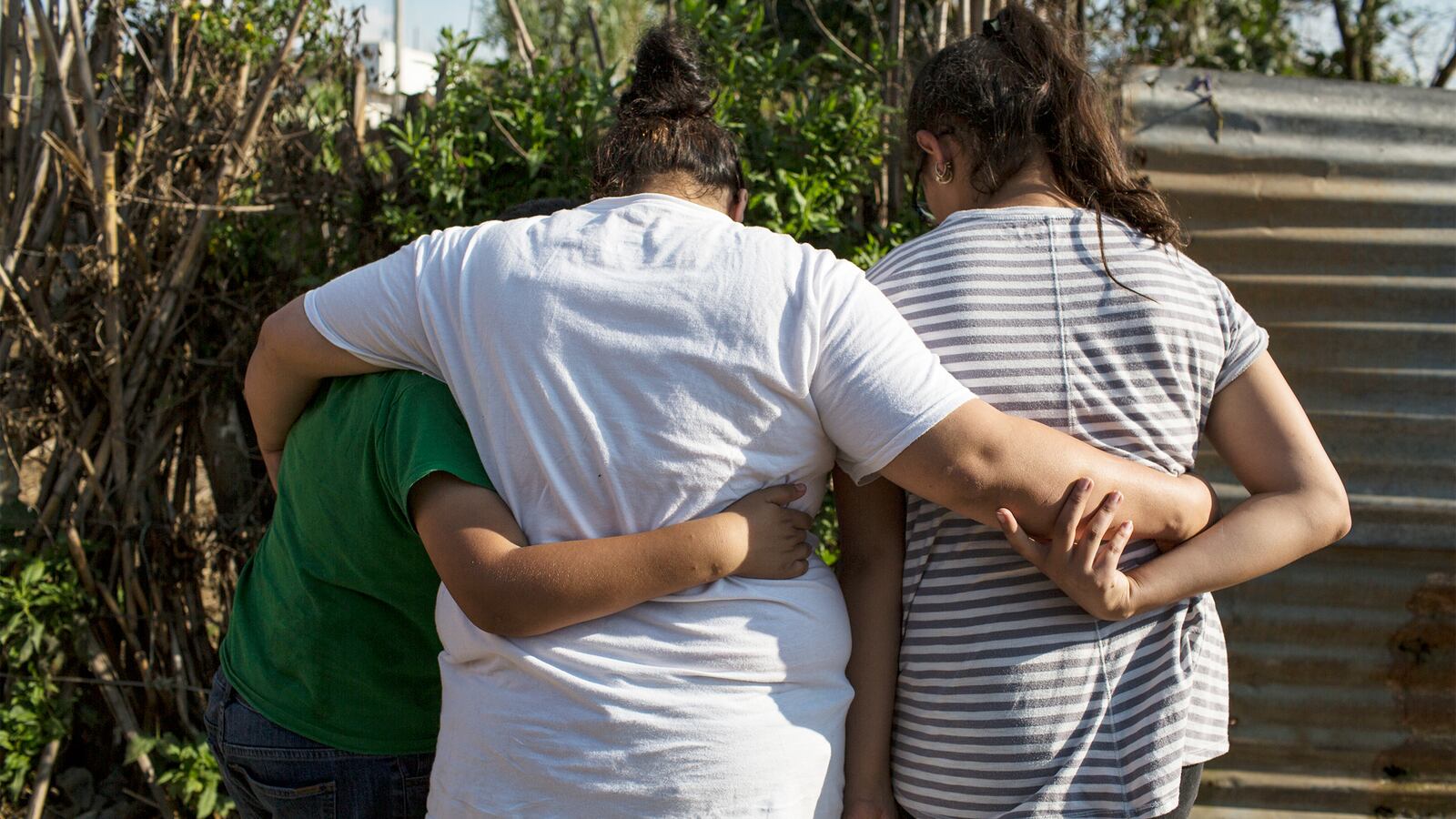CHIMALTENANGO, Guatemala—Mary’s American dream fell apart on Aug. 16 of last year. That was the day immigration enforcement and police officers knocked on the front door of the home she shared with her 12-year-old daughter Sami and 10-year-old son Jason in Brownsville, Texas.
“That day was horrible, truly awful,” recalls Mary. “It hurts when I remember.”
Early that morning, officers in the area were going house-to-house in search of an undocumented immigrant. When Mary opened the door, they asked for her identification and for the children’s Social Security numbers, which she could not provide. They asked whether she was in the country illegally. Mary stayed silent.
She remembers vividly what happened next.
“The official said to one of his guys, ‘Turn her around and take her.’ They handcuffed me. They put me in one of the cars… They were screaming at me while they were taking me. The saddest part was when they took my two kids. My little boy was sleeping and he didn’t know what was going on and he was looking for me. They put my kids in the other car.”
Mary, Sami, and Jason were taken to a local police station at which point their situation worsened. The family was forcibly separated, with Mary shuttled off to a migration detention center and the children taken to a shelter for unaccompanied minors. Mary didn’t know where Sami and Jason had been taken and the children didn’t know where their mother was. It was a heart-wrenching experience for all three.
At the time of Mary’s arrest and the family’s separation, she had been living in the U.S. for nearly 10 years, the children for almost eight.

Mary, 32, stands outside her home with her daughter, Sami, 12, and her son, Jason as she drops them off at their school in Chimaltenango, Guatemala.
© UNICEF/UN0217816/BindraFor Mary, the decision to leave Guatemala for the U.S. in 2008 was a painful, but necessary one.
Life as a young single mother of two young children in Guatemala was extremely difficult. Mary struggled to make ends meet and could not depend on the children’s father for support.
“I suffered a lot of domestic violence (during that time)… and I had nothing to give my children,” says Mary. She says the “turning point” came when she and the children were evicted from their one-room apartment because she couldn’t come up with money for rent. “The owner of the place kicked me off to the street, so I didn’t have anything else to give (my children). I was on the street with a child around four months old and one and a half-year-old little girl.”
Though it pained her deeply, Mary felt she had little choice but to leave the children with her mother, who lived nearby, and set off for the United States. Mary’s sister had told her previously she could get a decent paying job there so she could send money back for the kids. “I was seeing myself without a house, without food, without financial support—all of that pushed me to leave to give my children a better life.”
Mary took a small bus to the Mexican border in the middle of the night and paid bribes to the police and border control agents to allow her through so she could travel onwards to the U.S. frontier. The grueling journey took days and she traveled with only the clothes on her back and what little money she could scrape together for buses, water, and bribes. It was exhausting, dehumanizing, and dangerous. She says she was threatened with rape, but declines to go into further detail.
Mary eventually made it to the Rio Grande which separates Mexico from Texas, before crossing with 23 other migrants under cover of darkness. She quickly moved on to the town of Brownsville, on the recommendation of her sister, where she later found work in a restaurant kitchen.
One of Mary’s sisters made the same journey from Guatemala to Texas about two years later, bringing Mary’s young children with her to be reunited with their mother. It was difficult at first because her children didn’t remember who she was, but over time the family found comfort and happiness together. The U.S. became home and after living there for nearly eight years, it was all that Sami and Jason really knew—Guatemala was more of an idea or distant memory than a reality for them. Mary became kitchen manager of a local restaurant, and the children enjoyed school and had friends.
“I felt rich,” says Sami. “My house over there was full of things, I had my own room and we had the washing machine in a separate room and we had two bathrooms, each one with a shower and the living room had more things and also the dining room, the fridge as well. I felt good, because we had enough space to do the things we wanted to do.”
Sadly, the family’s hard-won new life was not to last.
After their initial separation by immigration authorities, Mary and the children would have no news of each other for two long months. “I had no idea where they were,” Mary says with tears in her eyes. The children began to think their mother had abandoned them.
Finally, in October of last year, Mary was told that Jason and Sami were being cared for in an institution for children supported by a Catholic charity. She was permitted to speak with them over the phone once a week. The first conversation was heartbreaking for Mary. “My son was crying (on the phone)… he asked me, ‘Are you in such a beautiful place that you don’t want to come here with me.’”
After four months, Mary was informed that she and the children would be deported, but it wasn’t until seven months after they had been separated that Mary was reunited with her children—on the plane that would carry them back to Guatemala.
Their reunion was bittersweet. “They looked unwell and were very upset,” Mary recalls. “My girl started crying and said, ‘You’re finally here and I’ll go with you wherever you go.’ Jason was very depressed and suffering from a skin rash. He told me never to leave him again.” Jason’s depression was such that he had been placed on anti-depressants while at the children’s shelter.
Asked what she thought about on the plane back to Guatemala, Mary responds, “I was worried about having nothing, where we would live, the children starting over again. I had plans for our lives and now those lives are gone.”

Mary walks her daughter, Sami, 12, and her son, Jason to school in Chimaltenango, Guatemala.
© UNICEF/UN0217814/BindraMary, Sami, and Jason are now three of the more than 31,900 people from Guatemala who have been returned from the U.S. and Mexico between January and April of this year. Back in Guatemala for a few months now, the transition has not been easy for the family.
Through friends on social media, they found a small house for rent in Chimaltenango.
Inside the cinderblock house, the walls are bare and exposed light fixtures dangle from the ceiling. There is a wall clock stopped at 442. Everything in the living room and kitchen are there only for necessity, excepting a few items meant to provide the children with some familiar comforts: some toys and coloring books, a colorful sign hanging from the ceiling which reads “bievenido a casa.” The accommodations are very basic and not at all what they were used to in the U.S. “Everything in this house is loaned or donated,” Mary says waving at the furniture around the kitchen.
The first two months’ rent were free, but Mary remains without a job and doesn’t know how she will find the US$250 a month she needs to keep the family living there.
The neighborhood is also dangerous because of gang activity, so Mary is worried for her children’s safety. “Here in this district, there’s so much violence,” says Mary. “Somebody dies every three or four days. The gangs take money from people. I don’t want them to know we have come from the U.S. because they will think we have money.”
Mary and the children are receiving some psychosocial services through a local NGO supported by UNICEF. The children are now in school and she is looking for work.
Yet what Mary really wants is to go back to the U.S. She is worried though that if they again tries to cross into the U.S. illegally, they’ll be caught and the children will be taken from her.
Nevertheless, Mary is hopeful. “This is God’s will,” she explains. “He knows what is in my heart. He got me there the first time and he will get me there again.”
Christopher Tidey is an emergency communication specialist for UNICEF, which continues to call on governments around the world to protect refugee and migrant children, and implement policies that ensure their wellbeing.






